Your cart is currently empty!
The rise of organic cannabis cultivation is not just a trend but a gateway to sustainable and environmentally friendly growing practices. This approach emphasizes the use of natural fertilizers, compost, and biological pest control methods, all while enhancing soil health and ecosystem sustainability. Let’s explore some of the best practices for cultivating organic cannabis.
Building a Thriving Soil Ecosystem
Creating a healthy soil ecosystem is the cornerstone of organic cannabis cultivation. Robust soil provides the nutrients plants need, supports beneficial microbes, and ensures superior growth.
- Compost Use: Incorporate organic matter into the soil. Compost provides a rich source of nutrients while improving soil structure and water retention.
- Rotational Planting: Rotate crops to balance nutrient depletion and pest cycles. This practice maintains soil vitality and reduces pest risks.
Nurturing Growth with Natural Fertilizers
Using natural fertilizers plays a pivotal role in ensuring cannabis plants receive essential nutrients without resorting to synthetic chemicals.
- Worm Castings: High in essential nutrients like nitrogen and phosphorous, worm castings enhance soil fertility and help retain moisture.
- Fish Emulsion: This liquid fertilizer is a potent source of nitrogen, promoting leafy growth and enhancing plant vigor.
Biological Pest Control Strategies
Managing pests organically involves leveraging biological control agents to maintain plant health without chemicals.
- Beneficial Insects: Introduce insects like ladybugs and predatory mites to naturally reduce pest populations.
- Companion Planting: Grow pest-repellent plants alongside cannabis. For example, planting marigolds can help deter a variety of insects.
The Environmental and Consumer Benefits
- Ecological Impact: Organic methods reduce chemical runoff, enhance biodiversity, and promote environmental health.
- Consumer Health: Cannabis grown organically is free from synthetic pesticide residues, making it a safer choice for consumers.
Embracing organic practices in cannabis cultivation not only fosters healthier plants but also contributes positively to ecological and consumer well-being. As the cannabis industry evolves, organic cultivation stands as a pillar for sustainable agricultural practices.
Conclusion
By focusing on building a healthy soil environment, utilizing natural fertilizers, and employing biological pest control, growers can produce organic cannabis that is both sustainable and beneficial. This approach not only protects our planet but also ensures a safer product for consumers, making organic cultivation a truly holistic effort.
Tags: OrganicGrowing, SoilHealth, NaturalFertilizers, PestManagement, SustainablePractices
Discover more from Magic Clones
Subscribe to get the latest posts sent to your email.


Leave a Reply